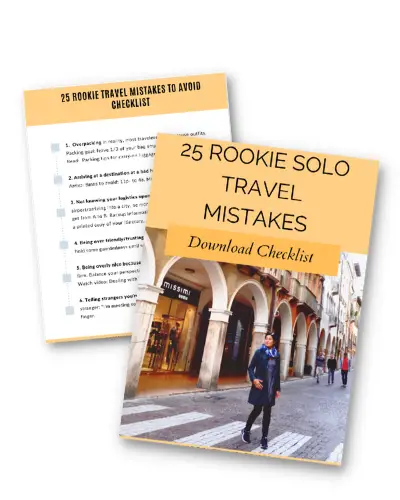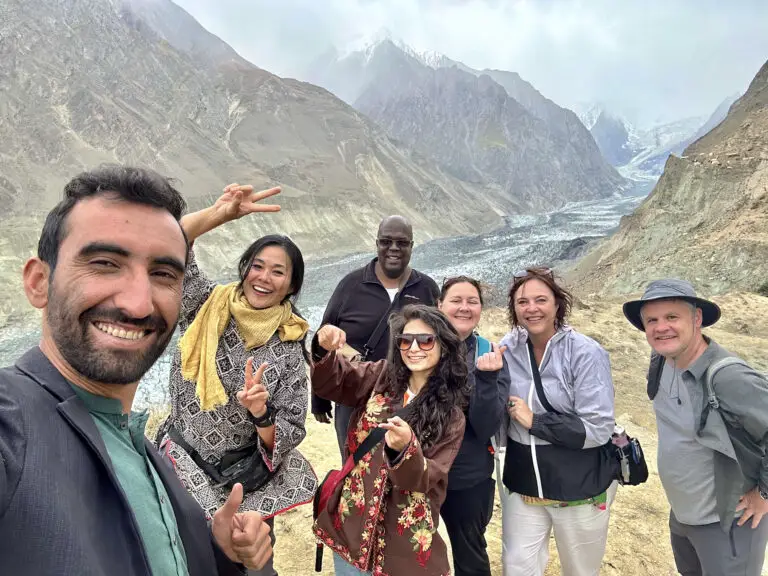Last Updated on June 7, 2023 by Christine Kaaloa
VIDEO: How to Deal with Travel Scams
.
Are you prone to travel scams? How do you avoid scam artists? How can you deal with travel scams if you ever get into them?
These are thoughts, which continually makes us question our safety as travelers and solo travelers. In some cases, questions like these can paralyze us with fear and impair our confidence; sabotaging us from freely traveling to the countries we want .
Today’s video travel Q&A comes from Renee in California, who asked:
Have you ever gotten into a situation where someone with bad intentions tried to befriend you. If so, what did you do to get out of it?
Thanks for asking the question, Renee. It’s a good question.
When I took my first solo trip (“the accidental one“), it started as a result of a travel scam that my friends and I got involved in India. My friends and I parted ways and I was left to deal with the unsavory scam artists on my own. I had to juggle not only my safety (as a solo female traveler in an all-male tourist office, where the agent was reacting explosively), but the fact, I was asking for a justifiable cash refund and wasn’t about to leave without it. I bluffed confidence, was calm and firm, but persistent. Though I emerged victorious, I realize there was a point, where things could have gone badly. (Luckily instead, GRRRLTRAVELER was born)
I’d like to say my experience in dealing with travel scams ends there. But life deals you lessons so you can learn and I don’t regret any of them. They’ve helped me become a more confident traveler and it makes me more of an interesting person today.
But back to safety…
.
Research the anatomy of a travel scam and scam artist
Table of Contents: VIDEO: How to Deal with Travel Scams
Many countries have their particular set of scam artists and touts , which focus on tourists (Traveling Canucks list types of travel scams here). Scam artists and touts come in all shapes and sizes. Never underestimate the elderly or children. Also, there are many different levels of scams. The majority of them are swindlers, looking to part you from your money. In extreme or desperate cases, the crime can turn towards violence, like in the case of Sarai Sierra, who was found dead in Turkey.
Do research in advance. Read your guidebook for tips on common tourist scams for the country you’re traveling to. Research alone will help greatly. The rest is up to you and how much of a street smart traveler you’re going to be.
My first “official” solo trip to Thailand:
I was looking for the entrance to Bangkok’s Golden Palace. I was lost and asked a tuk-tuk driver for directions. He told me the palace was closed and offered to give me a tour of Bangkok, instead. If it weren’t for the fact, I had just read about “the palace is closed” scam in my guidebook, I might have believed him. Instead, I smiled mischievously, wagged my finger at him playfully, with a “tsk, tsk, tsk…” and kept walking. He in turn, laughed, knew he’d been caught and then pointed me around the corner to the real entrance.
.
Experience has nothing to do with getting scammed
Many travelers, including those of us who travel more than most, have gotten burned once or more times by a scam and we still occasionally come up against ones that can be difficult to decipher until we’re actually stuck in them. While I recognize many enough to avoid them, there are special instances where I’m caught off guard. These are travel battle scars that make you tougher and a bit more savvy for the next time. This is not a reason to avoid travel. Instead, it’s a reason to be more cognizant of what’s going on around you and to learn from mistakes.
.
Touts vs Scam artists
The distinction between the two, occasionally feels blurred. Touts are generally looking to make a sale or for you to hire their (sometimes, illegal) service. They’re often bold, aggressive and relentless. They’ll pester you until you give in or can give them a hard rejection.
.
How polite is too polite?
I’ve seen many travelers attempt to be polite when dealing with touts. Women tend to be the worst, because they will defer to a “maybe” to sound less hash or rude. “No” is the word you need to use and you should be firm, even at the risk of appearing rude or impolite. Another reason to be honest about your intentions is that, locals in developing countries tend to take your word as sincere and wait for you to return. If you don’t return, they may seek you out at your hotel.
In any case, it’s best to be straight-forward and honest.
.
How to Deal with Travel Scams
If you haven’t checked out my solo travel safety tips, please do so and keep in mind… while our naivete of a foreign culture may not help us avoid getting into a scam, we can avoid going deeper. In my video ,”How to Deal with Travel Scams“, I only gave one example of a scam I commonly found in my travels as well as, a few personal examples and how I deal with them. The ones I’ve just shared above with you are off-video.
1. Extract yourself ASAP. (Start thinking of how you’re going to get away)
2. Be Firm
3. Never go into dark or secluded areas where people can’t see you or hear you scream.
4. If you do go into those places, excuse yourself. Think of an excuse to leave immediately~
5. Scan your environment to see who might be able to help.
.
Related Posts about Travel Scams I’ve encountered:
My narrow escape from Bangkok’s Ping-pong sex show scams
Varanasi’s Holy & Humorous Underbelly Tour
Dealing with scams in India and How to Get Out of ‘em


















